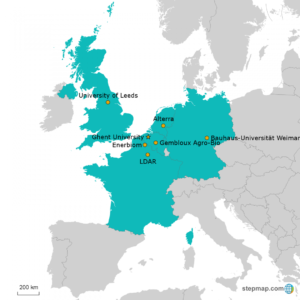Biorefine
The NWE region with its high population density, intensive industrial and agricultural activity producing large amounts of residues, is an ideal testing ground for tackling these challenges. Through the networks from each of our partners and supported by a range of innovative communication tools, efficient dissemination of knowledge on this theme towards local, regional and European stakeholders will be made possible in this project. This will support homogenisation of territorial disparities in legislation and policies that now hinder the development of a harmonised market of recycled minerals for high value application.
European regions are facing the necessity to migrate to a sustainable resource management. However, there are still some important challenges ahead to harmonise standards, techniques and markets in this area. Biorefine provides as first a cross-sectoral and international network in order to create knowledge on the quantity and quality of the available nutrient resources in NWE. It will provide an action-oriented approach to deliver applied technological solutions and transnational strategy development for improved recycling and valorisation of minerals that are valuable both from a natural resource as well as from an economic perspective. By bringing stakeholders together in a transnational knowledge platform, delivering pilot cross-sectoral applications of promising techniques on recycling and reusing of valuable minerals, and testing new systems for valorisation of recovered minerals, this project will provide improved and integrated responses to the challenges above.
This project will provide pathways to migrate to a more sustainable resource management, both from an economic as an ecological perspective. This is very important in the transition to a bio-based economy, as several minerals such as phosphorus (P) and potassium (K) that are nowadays being extracted through mining, are becoming scarce at rapid pace. If agriculture would continue to be dependent on high rates of P application, a depletion of more than 50% of the total resource base by 2100 and a complete depletion during the 22nd century in the worst case is predicted. This must be regarded as a very serious threat to the security of the P supply, as currently there are no substitutes for P supporting high agricultural yields. Meanwhile, the demand for nutrients is still increasing. This imbalance between availability and demand will consequently raise the prices for nutrient resources considerably in the near future.
Discover the deliverables
Partners
- Alterra
- Bauhaus-Universität Weimar
- Enerbiom
- Gembloux Agro-Bio Tech
- Ghent University
- LDAR
- Vlaco
- Vlakwa
